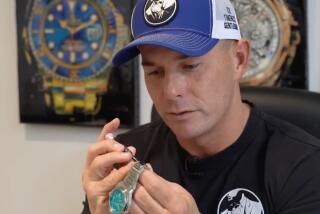Wymer Says He Operated Huge Fraud : Courts: Manager who ran complex scam against local governments from Newport Beach firm must pay $209 million in restitution. He faces up to 100 years in prison.
- Share via
LOS ANGELES — Money manager Steven D. Wymer pleaded guilty Tuesday to engineering a giant fraud involving government agencies, including the city of Orange, in what federal prosecutors termed “one of the most significant and financially devastating” cases of fraud ever.
The 44-year-old multimillionaire, who once managed $1.2 billion through his Newport Beach investment company, was ordered to pay $209 million in restitution. He faces up to 100 years in prison when he is sentenced on Jan. 15, but prosecutors say it is more likely he will serve less than 25.
Wymer promised to cooperate with authorities in recovering as much of the missing millions as possible. But prosecutors and officials of the cities victimized in what amounted to a Ponzi scheme suggested it would be difficult to recover even half their losses.
“I will devote as much time and effort as humanly possible to trace and recover the lost funds,” said Wymer in his first public statement since his arrest in December.
During his U.S. District Court hearing in Los Angeles, Wymer seemed serene, even upbeat at times, as he listened to U.S. District Judge Richard A. Gadbois Jr. instruct him on the implications of pleading guilty.
Wymer admitted to committing fraud, but added that he had initially started a legal enterprise, managing money and making various types of investments for 61 clients. All but 19 of those clients have had their money returned.
Those 19 victims, prosecutors said, lost $174 million and only $75 million of that amount has been found. In addition to the $174 million in restitution, Wymer was ordered to pay $35 million in interest.
Wymer admitted that he lost money through bad investments, then covered up the losses to clients and federal authorities by forging documents and making promises of high returns that were nonexistent.
“I began taking money from other clients to make up the losses,” Wymer said. “The false statements I made to clients were not planned from the beginning. The situation got out of hand and snowballed even though I tried, without success, to remedy the situation.”
At one point, Wymer’s voice cracked as he read his prepared remarks.
“I am deeply sorry for and ashamed of what I have done,” Wymer said. “Unfortunately, my illegal activities have greatly hurt some of my clients, my wife, my daughter and my family.”
But some government officials expressed anger at Wymer, saying that his guilty plea will not help their cash-strapped cities.
“In any dealings involving Mr. Wymer, I’m extremely skeptical,” said Torrance City Atty. Kenneth Nelson. “Insofar as the city getting any money back from him, I will believe it when I see it and when the check clears the bank.”
The Securities and Exchange Commission, which also settled its civil case against Wymer on Tuesday, uncovered Wymer’s fraud last fall. In February, Wymer agreed to an SEC order to revoke his securities license and agreed not to violate securities laws in the future.
The U.S. attorney’s office initially charged Wymer with 30 counts of various felonies. On Tuesday, Wymer pleaded guilty to nine counts, including racketeering. He also agreed to forfeit his personal wealth, worth an estimated $12 million.
Wymer remains free on $600,000 bail and continues to wear an electronic anklet so that his movements can be monitored.
Prosecutors said at an earlier press conference that Wymer had deliberately shifted money around in a kind of financial shell game to enrich himself. While cities such as Orange and Torrance believed their money was safe in his hands, prosecutors said Wymer was using their funds to underwrite a millionaire’s life.
In addition to owning four pricey properties in Newport Beach, Wymer also owned houses in Idaho, New York City, and Palm Beach County, Fla. Authorities also seized 10 luxury automobiles, according to an SEC complaint made public Tuesday.
By the time authorities stepped in and closed his enterprise, they said, Wymer had siphoned off up to $12 million to pay for a lavish lifestyle, had lost $66 million in bad securities deals, used $13.5 million to fund his operation, and paid $75 million in bogus profits to hide faked securities transactions.
“He was robbing Peter to pay Paul,” said Assistant U.S. Atty. James R. Asperger. “He acted out of greed and he certainly lived a very lavish lifestyle as a result.”
One SEC official said that few fraud cases conducted by an individual surpass the damage done by Wymer. By comparison, junk bond king Michael Milken was ordered to pay $600 million in fines. And Ivan Boesky was ordered to pay $100 million--less than half the amount Wymer is ordered to give back to clients.
“This brings to a close the first chapter of one of the most significant and financially devastating cases of securities fraud ever perpetrated,” said Elaine Cacheris, regional administrator for the SEC.
Authorities would not say whether they expect to make additional arrests, but said that the probe was continuing.
Wymer, through two companies he owned--International Treasury Management in Newport Beach and Denman & Co. in Irvine, which was also known as SDW Asset Management--managed as much as $1.2 billion in funds, largely from government agencies, such as cities and counties.
Ten California cities and government entities in Colorado and Iowa are among those who lost money to Wymer, including the cities of Orange, which prosecutors said lost an initial investment of $5.7 million, and Torrance, which lost $4.9 million.
The biggest loser by far was a coalition of government agencies called the Iowa Trust, which is missing $75 million and is involved with civil suits against Indio and Palm Desert and other victims for disputed funds that have been discovered and will be transferred to a pool set up by the SEC for eventual disbursement to all victims.
The plea is “positive news” for the Iowa Trust, said David J. Lyons, a receiver appointed to oversee the trust after the scandal broke. Wymer’s cooperation “may prove useful in proving our claim to other misappropriated money. It is important that Mr. Wymer’s acts be punished and that his punishment include time in jail,” he said.
Wymer’s acknowledgment of culpability in the case did not make officials of the cities he targeted any less angry over losing millions of dollars.
In Orange, the reaction was less than optimistic.
“His pleading guilty is not going to help us. He doesn’t have the money,” Orange Councilwoman Joanne Coontz said. “He was a high roller. He lived high. He purchased a lot of expensive automobiles, etc. When you sell properties (like that) you don’t get full value of when purchased.”
Longtime civic activist Carole Walters agreed, saying that Wymer’s plea meant little to the citizens of Orange.
“Where is the money for the taxpayer?” Walters said. “We gave millions away in taxpayer money. It just walked out the door.”
The Fall of Steven D. Wymer
Dec. 6, 1991: Securities and Exchange Commission officials file civil lawsuit in U.S. District Court against Steven D. Wymer and his Irvine-based companies, Institutional Treasury Management and Denman & Co. He is accused of defrauding his clients, which include city and county governments, banks, thrifts and pension funds in 13 states and Micronesia of more than $100 million.
Dec. 12: U.S. District Judge Richard A. Gadbois Jr. freezes Wymer’s personal assets and the assets of his companies.
Dec. 17: Wymer is arrested at his Newport Beach home on federal criminal charges of mail and securities fraud; U.S. Magistrate Venetta S. Tassopulus denies bail.
Dec. 20: Judge Gadbois lifts freeze on most of the money in Wymer’s companies.
Jan. 2, 1992: Wymer indicted on 30 counts of securities fraud, mail fraud, money laundering, obstruction of justice and other federal charges; pleads not guilty four days later and vows to “vigorously defend himself against all charges.”
Jan. 8: Federal authorities seize Wymer’s personal property, valued at $10 million to $15 million, alleging that his luxury cars, boats and homes are ill-gotten gain from a securities swindle.
Jan. 9: A federal judge sets bail at $600,000; Wymer released from jail two weeks later.
Jan. 15: Cities of Loma Linda and La Quinta, Calif. are first to file lawsuits against Wymer to recover $16.8 million in allegedly misappropriated funds; four months later, city of Orange files suit.
Feb. 19: Wymer agrees to settle civil suit filed by SEC; allowing the agency to focus on recovering investors’ money.
Feb. 24: Trial date set for Sept. 15.
March 12: Wymer’s companies file for bankruptcy.
Sept 15: Trial postponed while Wymer’s attorneys ponder plea bargain.
Sept. 29: Wymer pleads guilty to fraud, is ordered to pay $209 million in restitution. He faces up to 100 years in prison at Jan. 15 sentencing.
Researched by DALLAS M. JACKSON / Los Angeles Times
Times staff writers Michael Flagg, Anthony Millican and correspondent Helaine Olen contributed to this report.
More to Read
Sign up for Essential California
The most important California stories and recommendations in your inbox every morning.
You may occasionally receive promotional content from the Los Angeles Times.













